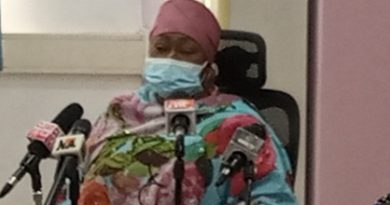CLEEN Foundation Holds Stakeholders Dialogue on Emerging Security Challenges in the South South
Oru Leonard
The CLEEN Foundation in collaboration with Ford Foundation, on Thursday, September 9, 2021 held a zoom meeting on Stakeholders Dialogue on Emerging Security Challenges in the South South.
In her welcome address, The Acting Executive Director, Mrs Ruth Eguono Olofin said the meeting which aimed at interrogating emerging security concerns driving violent conflicts in the region, was with a view to facilitate capacities to transform these conflicts into a peaceful and secure nation in collaboration with critical stakeholders.
“The strategic importance of the oil-rich South- South States in southern Nigeria to National stability and Global energy markets is a persistent theme widely discussed in policy and development circles, development agencies, human rights organizations, and the mainstream media. The underlying causes of unrest, including chronic underdevelopment and the weakness of local leadership, are barely being addressed in the region, as her abundant natural wealth stands in stark contrast to its palpable underdevelopment”, she said.
She recalled that from the inception of civilian administrations in 1999, the state and local Governments in the region have been more vocal in their frustration at what they believe is a concentration of resources and power at the center. Communities have come into conflict with oil companies, and with the security forces over a range of issues including payments, land acquisition, and environmental damage. Armed groups mainly youths have waged systematic campaigns against the Government and Oil companies to have their demands met, and unemployed youth have often taken advantage of the situation by engaging in criminal acts, including kidnapping and oil theft. The oil producing Niger Delta states receive 13% of the revenues from the oil and gas which they produce, along with the statutory monthly allocation given to all 36 Nigerian states and the Federal capital territory. However, the substantial increase in revenues flowing into these states and their local government areas has not translated into sustained development in the region.
She further said that following the Amnesty offered by former President YarAdua in 2009 to over 20,000 armed fighters, an uneasy quiet has settled over the region, yet the fundamental conditions of extreme deprivation have remained unchanged. Most people from the Niger Delta feel politically disenfranchised and disadvantaged in comparison to the rest of Nigeria. They are frustrated that they cannot legitimately benefit from the oil resources, and they often distrust their local leaders who purport to negotiate on their behalf. Conflict occurs amongst and within communities over access to benefits from Government and oil extracting companies being designated as a host community to an oil facility comes with benefits, but historically this practice has exacerbated jealousy and fighting among communities and has also led to disputes over oil boundaries.
It is imperative to note the situation of young people in Nigeria particularly at the South-South region remains precarious as they have remained marginalized and alienated in terms of voice, empowerment and integration in the national scheme of things.
According to her, “This is illustrated by the alarming rate of youth unemployment and underemployment, illegal migration, involvement in violent and cybercrimes and willingness to leave the country in droves through unimaginably dangerous routes in search of nonexistent greener pastures or staying behind to commit all kinds of nefarious activities ranging from armed robbery, ethno-religious violence, illegal oil bunkering, militancy, kidnapping, cultism, cybercrime to political thuggery. In many cases, unemployed youth have been recruited into armed militant groups waging systematic campaigns/wars against the oil industry and the security agencies to further their demands. At the same time powerful interests, often allied with local unemployed youth, take advantage of the chaotic situation to illegally divert oil revenues and engage in oil bunkering or theft.
“Consequently, unemployment and underemployment rates are higher in the core oil producing states of the south south region than in any other part of Nigeria, and they are more pronounced in urban areas.”
Mrs Olofin noted that in very recent times, public security agents in Nigeria have continuously undermined human rights of local communities and populace within the extractive industries. Private security providers and security personnel of extractive companies have been allegedly involved in the use of excessive force and violating human rights of persons when protecting local population.
“The lack of appropriate human rights due diligence frameworks has continued to reinforce institutional weakness and noncompliance with extant laws.
It is in recognition of these issues, that the CLEEN Foundation is organizing this event to Identify the structural causes and manifestations of violent conflicts in the region, examine the suitability and sustainability of existing initiatives by the Government to respond to themanifestations of conflict and design concrete strategies based on the gaps observed to transform the conflictsand provide local solutions for an endearing peaceful society through collaboration with stakeholders in the region”, she lamented.
The Acting Executive Directort thanked Ford Foundation for supporting the implementation of the project and other partners for their unflinching commitment thus far in the intervention while wishing all a fruitful deliberation.
Researchers from Akwa Ibom, Balyelsa, Cross River, Delta and Rivers States took time to explain and present their reports which shows significant insecurity arising of operational or implementation defeciencies of government projects and polices.




